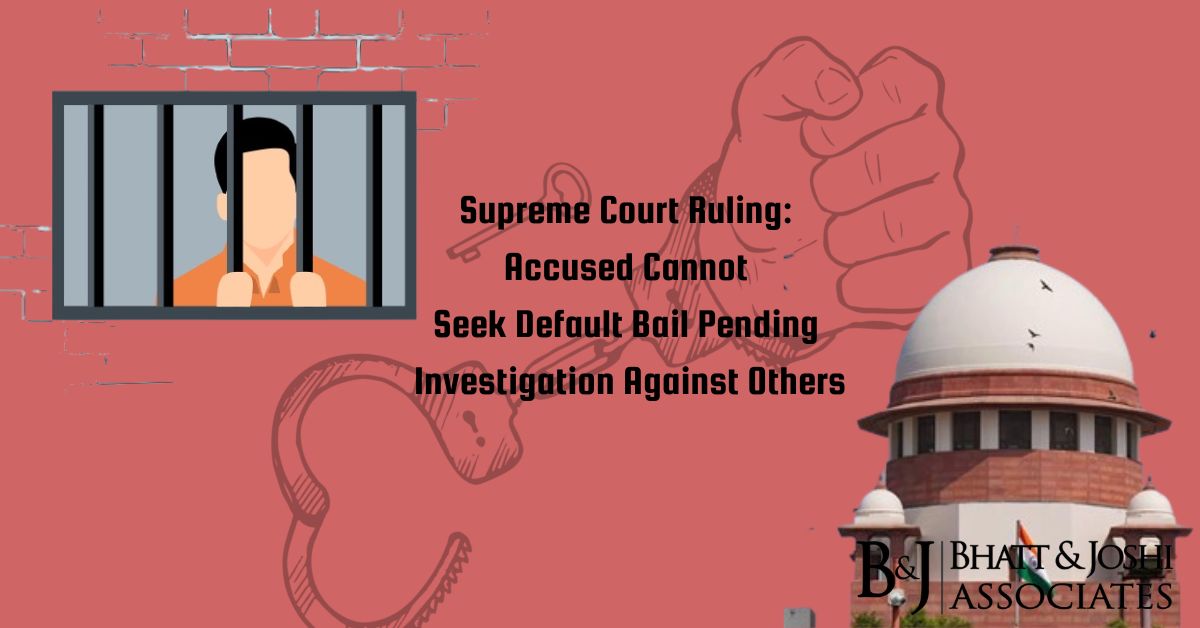Default Bail in Supreme Court Ruling: Limits When Accused Can Seek Bail During Ongoing Investigations
Introduction
In a recent ruling, the Supreme Court has provided clear guidelines about when a person accused of a crime can request default bail. The court also emphasised that the fact that an investigation is ongoing against other individuals involved in the case does not provide the main offender the ability to claim this legal entitlement. The case pertained to the alleged involvement of Kapil Wadhawan and Dheeraj Wadhawan, former promoters of DHFL, in a large-scale bank loan fraud.
Case Background
The Wadhawan brothers were accused of participating in a significant bank loan fraud, involving a criminal plot to deceive a group of 17 banks, headed by the Union Bank of India. The allegations encompassed embezzlement of funds and manipulation of DHFL’s financial documentation, resulting in a significant financial setback for the partnership.
Decoding Sec 167: Default Bail Dynamics Pre & Post Charge Sheet
The Supreme Court emphasised the importance of Section 167(2) of the Code of Criminal Procedure (CrPC), stating that an accused person can only request default bail if the charge sheet has not been filed and the investigation against them is still ongoing. Upon the filing of the charge sheet, the entitlement to automatic release on bail in the event of a failure to appear in court is no longer applicable.
Errors in Granting Default Bail
The court observed significant legal mistakes made by both the Special Court and the Delhi High Court when granted bail to the Wadhawan brothers. The statement emphasised that the legal entitlement to automatic release on bail cannot be demanded if the charge sheet has been submitted within the specified time frame and the court has acknowledged the alleged crimes.
Indefeasible Right under Article 21
The Supreme Court has restated that the right to automatic release on bail as provided in Section 167(2) of the Criminal Procedure Code (CrPC) is not only a right established by law, but also a fundamental right derived from Article 21 of the Constitution. Nevertheless, it explicitly stated that this entitlement can only be upheld prior to the submission of the charge sheet, and it loses significance after the charge sheet is filed.
Code of Criminal Procedure Requirements
The article explores the procedural elements of the Code of Criminal Procedure (CrPC), elucidating the criteria that must be met for an accused individual to be eligible for statutory bail and the specific timelines associated with this process. In this particular instance, the charge sheet was submitted on the 88th day following the registration of the First Information Report (FIR).
Allegations of Financial Scam
The attention is now directed towards the accusations of a fraudulent bank lending scheme, highlighting the substantial amount of money involved, the criminal collaboration, and the consequences for the group of banks involved. The investigation examines the involvement of DHFL’s senior officials in persuading the consortium to approve significant loans.
Conclusion on Default Bail: Legal Precedents and Implications
The Supreme Court’s order establishes a precedent by elucidating the restrictions on seeking default bail, particularly in situations where investigations against other accused individuals are still ongoing. The purpose of this decision is to maintain the honesty and fairness of legal processes and guarantee that legal rights are exercised correctly within the established legal structure. The article closes by emphasising the wider ramifications of this ruling on future cases pertaining to automatic release on bail and the obligations of investigative agencies to promptly submit charge sheets.
Our Comments
The recent ruling by the Supreme Court in the matter of former DHFL promoters, Kapil Wadhawan and Dheeraj Wadhawan, has offered a substantial clarity regarding the requirements for obtaining default bail under Section 167(2) of the Code of Criminal Procedure (CrPC). This case highlights that once a formal accusation is submitted and the court acknowledges the crimes, the entitlement to automatic release on bail no longer applies, emphasising the legal and constitutional significance of this entitlement under Article 21. The court’s thorough scrutiny of the legal stance regarding default bail underscores the need of adhering to procedural norms. The flaws emphasised in the rulings of both the Special Court and the Delhi High Court emphasise the necessity for a meticulous comprehension of legal provisions, particularly when handling intricate financial frauds and multi-crore bank loan situations. The verdict not only affects the particular lawsuit concerning the Wadhawan siblings but also sets a precedent that will serve as a guiding principle for future cases with comparable legal intricacies. It highlights the intricate equilibrium between the rights of the accused and the legal system established to guarantee impartial and equitable legal proceedings. Ultimately, the ruling by the Supreme Court serves as a reminder of the judiciary’s dedication to preserving the principles of the legal system and ensuring the integrity of judicial processes. This statement emphasises the need of adhering to the specified time limits and procedural rules outlined in the Code of Criminal Procedure when exercising statutory rights, such as default bail. This verdict will unquestionably enhance the body of legal principles related to default bail, offering lucidity and direction to legal professionals, law enforcement entities, and the judiciary when dealing with complex situations involving financial crimes.
 Whatsapp
Whatsapp


